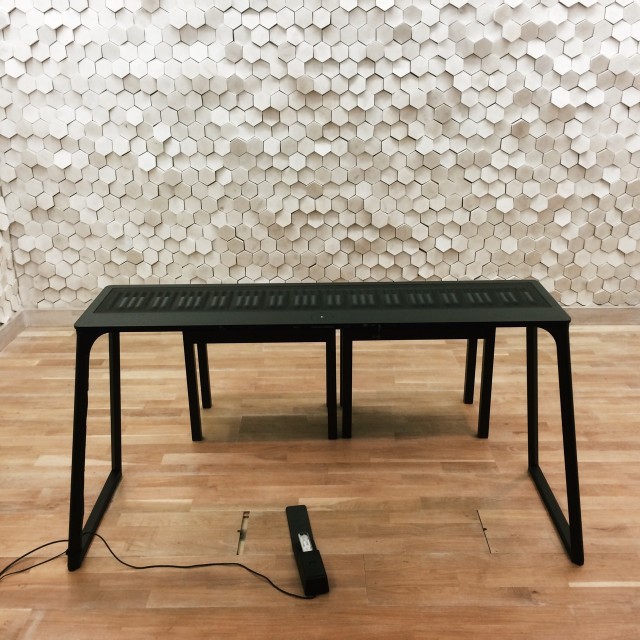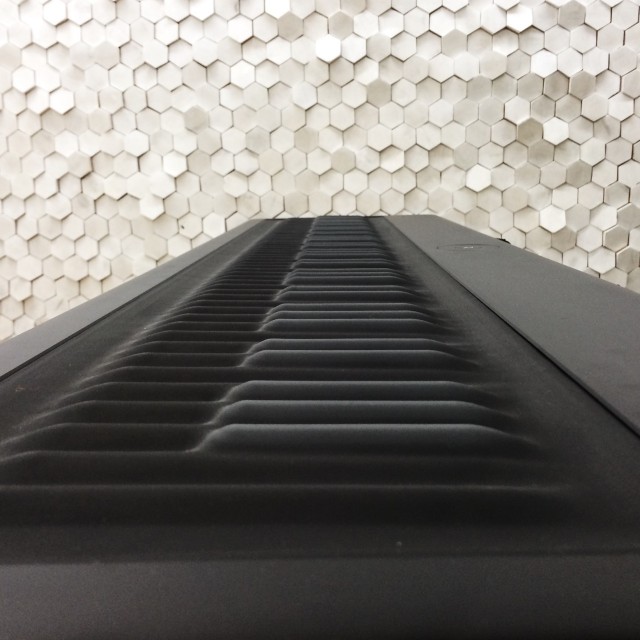Here’s some important news that might impact you – even though you may never have heard of either the instrument maker or know anything about code libraries. Bear with us. But an experimental instrument builder and design shop just acquired the most popular framework used by audio developers, a set of free and open source gems.
The film explaining the announcement:
First, there’s ROLI. Now, to most of us in the music world, ROLI are the Dalston, London firm that make an alternative keyboard called the Seaboard – a sort of newer cousin to the Haken Continuum Fingerboard that uses foam that you press with your fingers to add expression and bend pitches. But ROLI wants you to think of them as a design shop focused on interaction. So they don’t just say “we’re going to go make weird instruments”; whether you buy the pitch or not, they say they want nothing less than to transform all human machine interaction.
And yes, there’s a film for that, too. (Those of you playing the startup drinking game, fair warning: the words “design” and “artisanal” appear in the opening moments, so you could wind up a bit unhealthy.)
ROLI isn’t a company forged in the mold of most music manufacturers. They’re most definitely a startup. They have an in-house chef and a Wellness Manager, even before they’re widely shipping their product. That’s in stark contrast to the steady growth rate of traditional music gear makers. (I’ve seen both Native Instruments and Ableton put up charts that show linear hiring over a period of many years. Many other makers were bootstrapped.) The difference: record US$12.8 million in round A funding. And as the Wall Street Journal noted at the time, that comes at a time when some big players (Roland) are seeing diminished sales.
With that additional funding, ROLI are being more aggressive. If it pays off, it could transform the industry. (And I’d say that’s true even – maybe especially if – they manage to use a musical instrument as a gateway to other non-musical markets.)
So, they’re buying JUCE. JUCE is an enormous library that allows developers to easily build audio plug-ins (VST, VST3, AU, RTAS and AAX are supported), design user interfaces quickly with standard libraries, and handle audio tasks (MIDI, sound, and so on), networking, data, and other tasks with ease. A million lines of code and modular support for these features give those developers a robust toolkit of building blocks, saving them the chore of reinventing the wheel.
Just as importantly, the results can run across desktop and mobile platforms – OS X, Windows, Linux, iOS, and Android all work out of the box.
I couldn’t get solid stats in time for this story on how many people use JUCE, but it’s a lot. KORG, Pioneer, AKAI, and Arturia are just a few names associated with it. You almost certainly have used JUCE-powered software, whether you’re aware of it or not.
But ROLI aren’t just acquiring a nifty code toolkit for audio plug-in makers. JUCE’s capabilities cover a range of non-audio tasks, too, and include an innovative real-time C++ compiler. And they acquire not just the code, but its creator Julian Storer, who will become Head of Software Architecture for ROLI.
What does this mean for JUCE? Well, in the short term, it means more investment. Previously the work of Jules alone, a solitary genius of C++, JUCE will now have a team of people contributing, say ROLI. They will add staff to focus on developing the framework as Jules is named “Editor-in-Chief” of JUCE – a sort of project lead / curator for the tools. For that reason, it’s hard to see this as anything but good news for JUCE developers, for the time being. In fact, Jules is very clear about his ongoing role – and not much changes:
And for the foreseeable future, it’s still going to be me who either writes or approves every line of code that gets into the library. I’m hoping that within a couple of years we’ll have a team of brilliant coders who are all pumping out code that perfectly matches the quality and style of the JUCE codebase. But in the meantime, I’ll be guarding the repository with an iron fist, and nothing will be released until I’ve checked, cleaned and approved it myself. But even in the short-term, by having a team behind the scenes working on features, and with me acting as more of an “editor-in-chief” role to ensure that the code meets the required standard, we’ll be able to be a lot more productive without losing the consistency and style that is so important to JUCE’s success.
Read his full letter on the JUCE forum.
JUCE’s source is already open – most modules are covered by the GPL (v2 or v3, depending). You therefore pay only if you want to release closed-source code (or, given Apple’s restrictions, anything for iOS); commercial licenses are not expensive.
The murkier question is actually how this will evolve at ROLI. The word I heard was immediately “ecosystem.” In the Apple-centered tech world, it seems, everything needs to have an SDK – even new rubber keyboards – so ROLI may hope to please its investors with the move. And that makes some practical sense, too. In order to communicate with software instruments, the Seaboard needs to send high-resolution expression data; ROLI use System Exclusive MIDI. It’s now a no-brainer to wrap that directly into JUCE’s library in the hopes plug-in and software instrument makers bite and add support. What’s interesting about this is that it might skirt the usual chicken and egg problem – if adding compatibility is easy enough, instrument makers (always fans of curiosities anyway) may add compatibility before the Seaboard has a big installed base.
In fact, that in turn could be good for makers of other alternative instruments, too; ROLI are working on standardizing on methods for this kind of data.
Of course, that still depends on people liking the Seaboard instrument. And ROLI say their ambitions don’t stop at futuristic pianos. CEO/Founder Roland Lamb (that’s no relation to Roland the Japanese musical instrument company) paints a broader picture:
“At ROLI, our larger vision is to reshape interaction. To do that, we need to transform every technological link from where people create inputs, to where computers create outputs. That’s a tall order, but acquiring and investing in JUCE is our most significant step towards this challenging goal since we invented and developed the Seaboard.“
Now, I am frequently in public appearances making just this argument, that musical instrument interaction can lead to innovative design solutions in other areas. But in this case, I don’t know what it means. Whatever ROLI is working on beyond the Seaboard, we haven’t seen it. At least as far as JUCE, they’re building competency and assets that enable human/hardware communication in the software frameworks themselves. We’ll just have to see how that’s applied.
In coming weeks, I hope to look a little closer at how the Seaboard and other similar devices handle communication, and whether there’s a chance to make that area smarter for a variety of hardware. And I’ll also let you know what more we learn about ROLI and JUCE.
If you’re a developer, there are ongoing JUCE meetups planned, so you can check out the framework yourself or meet other existing users. These aren’t limited to London – Paris and Helsinki were recent tour stops, with Berlin (in Ableton HQ, no less) upcoming.
JUCE Acquisition Press Release

